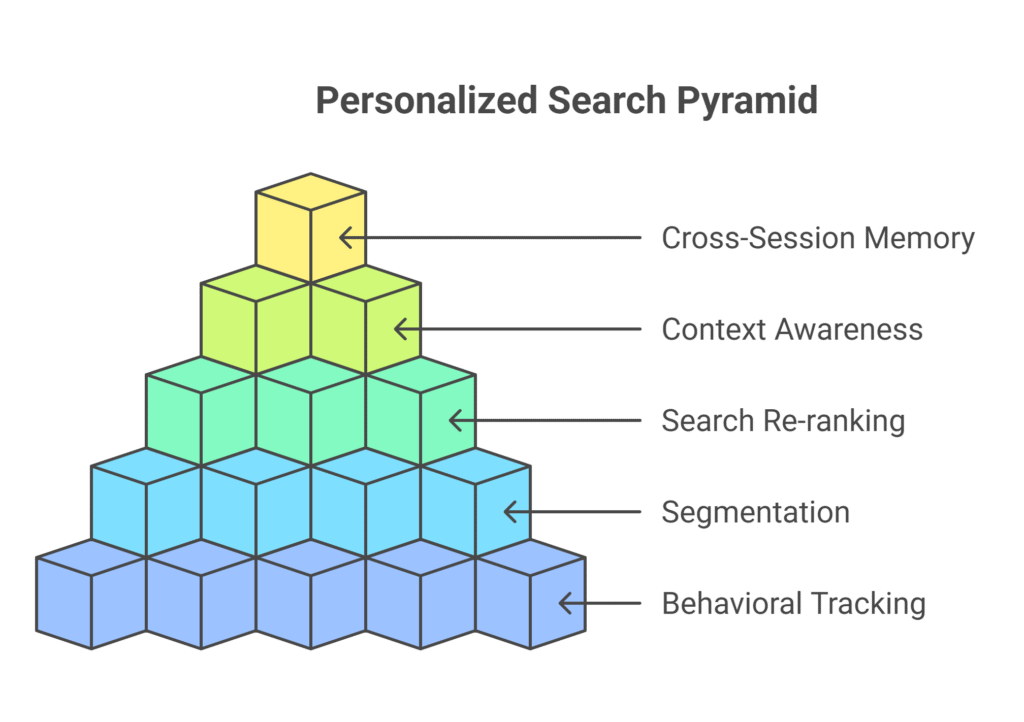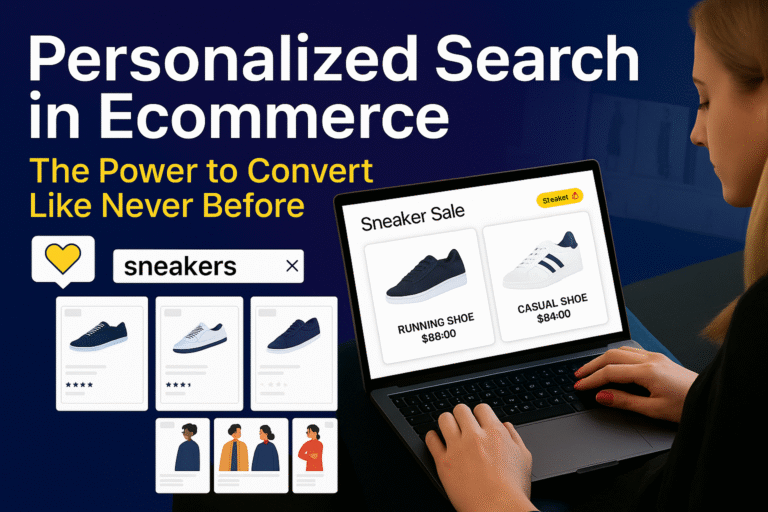Search is no longer just about speed. It’s about relevance. In e-commerce, personalized search has become the invisible salesperson guiding every click, scroll, and tap toward conversion. When users feel like your store gets them, they don’t just browse they buy.
In this blog, we break down what personalized search really means, how it works, and why it’s critical to delivering 1:1 shopping experiences that drive revenue.
What Is Personalized Search?
Personalized search refers to tailoring search results based on individual user behavior, preferences, demographics, and intent. Instead of showing the same generic results to everyone, your store adapts and evolves with each customer interaction.
It’s Amazon showing you similar tech accessories after buying a laptop. It’s Netflix-style discovery, applied to commerce.
Why It Matters in E-commerce
Generic search frustrates. Customers expect immediate, relevant results, and when they don’t get them, they bounce.
The Problem with Standard Search:
- Ignores past purchase history
- Fails to adapt to preferences
- Doesn’t recognize returning users
- Can’t interpret intent beyond the literal query
The Impact of Personalization:
- 80% of consumers are more likely to buy when offered personalized experiences (Epsilon)
- Personalized search can increase conversion rates by up to 30%
- Average order value (AOV) often increases as product relevance improves
How Personalized Search Works (Behind the Scenes)

- Behavioral Tracking
Browsing patterns, clicks, add-to-carts, and past purchases feed into dynamic user profiles. - Segmentation
AI segments users by preferences, price sensitivity, brand loyalty, and more. - Search Re-ranking
Search engines reprioritize results in real-time based on what similar users have clicked or bought. - Context Awareness
Season, device, time, and even weather can influence personalized suggestions. - Cross-Session Memory
Even if users don’t log in, cookies and fingerprinting help recall behavior over time.
Key Features of a Personalized Search Engine
- Real-Time Adaptation – Results shift dynamically as users interact with your site.
- Intent Understanding – Goes beyond keywords to grasp what the shopper means.
- Demographic Adjustments – Young adults may see trendier products; professionals might see premium tiers.
- Multi-Channel Learning – Data from mobile, desktop, or even support chats can enhance the profile.
- AI + NLP Algorithms – Power intelligent suggestions, spelling correction, and semantic search.
Real Use Cases in E-commerce
- A returning customer searches “black dress”—they see their preferred brands and size filters already applied.
- A first-time visitor typing “running shoes” gets category pages ranked by current sales trends and location (e.g., waterproof styles during monsoon).
- A user who often buys eco-friendly items gets “sustainable” products prioritized—even without asking.
How to Implement Personalized Search on Your Store
Step 1: Audit your current on-site search.
Look at search exits, zero-result queries, and time-on-search metrics.
Step 2: Pick a tool or platform with AI personalization features.
You want something scalable, insightful, and low-code.
Step 3: Set up behavioral tracking and analytics.
Ensure you’re capturing rich data for personalization logic.
Step 4: A/B test search versions.
Measure conversion impact of personalized vs. generic search results.
Why Expertrec Is a Game-Changer
For e-commerce stores, especially on platforms like Shopify, Magento, or WooCommerce, Expertrec brings personalized search to life with ease.
Key Features of Expertrec:
- AI-powered semantic search with real-time result adaptation
- Personalization based on user behavior, past queries, and purchase history
- Smart autocomplete and typo tolerance
- Visual and voice search integration
- Detailed search analytics dashboards
- Easy integration with no code required
Whether you’re scaling up or optimizing for ROI, Expertrec turns your search bar into a revenue machine.
Conclusion
In today’s e-commerce landscape, personalized search isn’t optional, it’s essential. Shoppers want to feel understood, and when your search engine delivers what they want before they even ask, you win their loyalty (and their wallet).
With tools like Expertrec, creating these intuitive, high-conversion journeys doesn’t require a dev team or months of setup. It’s fast, powerful, and proven.
Frequently Asked Questions
1. What if I don’t have much user data?
Even basic click behavior and query tracking help personalize effectively from the get-go.
2. Does personalized search slow down my site?
Not if implemented right. Expertrec, for example, is built to be lightweight and optimized for performance.
3. Is it compatible with mobile users?
Absolutely. Mobile-first design ensures personalization works across all devices.
4. What about privacy concerns?
All good personalization tools are GDPR and CCPA compliant with anonymous tracking options.
5. Can personalized search increase AOV?
Yes, by showing users exactly what they’re most likely to buy, upsell, or bundle.




